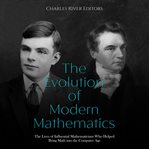Nonfiction
eAudiobook
Details
PUBLISHED
Made available through hoopla
EDITION
DESCRIPTION
1 online resource (1 audio file (6hr., 02 min.)) : digital
ISBN/ISSN
LANGUAGE
NOTES
Read by Jim Walsh
In the last 50 years, life has been simplified by the awe-inspiring advancements that have been achieved in the world of computer science and technology. In 1976, Steve Jobs and Steve Wozniak unveiled the Apple I, the first-ever computer that operated on a single-circuit board, just five years after a team of IBM engineers introduced the "floppy disk," which revolutionized data-sharing. In 1981, the first personal computer - IBM's Acorn - equipped with an optional color monitor, two floppy disks, and an intel chip was rolled out to the masses, and the dynamic evolution of the World Wide Web soon followed. Today, the world is in the midst of the transformative and ever-developing Digital Age, otherwise referred to as the "Age of Information." It has been an unprecedented, remarkable, and explosive era marked by social media and computer-generated imagery (and with it, deep fakes), among other novel, previously unimaginable concepts. The bulky monitors and blocky towers of personal computers and laptops, which were once upon a time considered fashionable, futuristic contraptions, have since been replaced with a sleek and stylish array - both multi-functional and specialized - of aerodynamic, minimalistic devices, ranging from smartphones and tablets to lightweight laptops and full-fledged gaming set-ups packed with powerhouse processors. This new age was brought forth in large measure by the different works of scientists and mathematicians spanning several centuries. Blaise Pascal's time on Earth may have been brief - no more than 39 years - but this unconventionally educated, yet brilliant scientist, mathematician, and man of letters accomplished more than most people could hope to achieve in two lifetimes. The SI unit of pressure, Pascal, is named after this polymath, and he is the namesake of a procedural programming language designed by Niklaus Wirth between the years of 1968 and 1969. On top of the countless busts, statues, and plaques erected in his honor, several institutions bear his name, as does a university in his hometown of Clermont-Ferrand. The Blaise Pascal Chairs, a glittering accolade awarded to exceptional international scientists every year, was also established in his honor. Sir Isaac Newton is widely considered the most influential scientist in history, best known for the discovery of gravity and the subsequent laws of motion that he theorized. Schoolchildren around the world are still taught the famous legend about an apple falling on Newton's head, but that colorful story and the preoccupation with Newton's work in physics tend to make people forget Newton's work in other fields. Using empirical studies, Newton developed theories about light prisms, how matter cools, and even tried studying and calculating the speed of sound. And those are just the sciences; Newton also helped develop several mathematical fields, including calculus. A recent movie revived interest in Alan Turing's achievements with computing during World War II, but it was Charles Babbage who was the first to conceive the notion of a programmable and automatic universal computer, which, on top of its ability to calculate any mathematical equation at an unmatched speed, could also be used for a seemingly infinite number of other applications. In other words, he envisioned the precursor to the modern computer. Turing is credited with envisioning a concept so momentous that it ultimately led to the creation of what is now considered the world's first computer. Turing was far from the suave, pipe-puffing dandy that many might associate with such a grand and futuristic idea, but he was certainly not a stereotypically bookish character whose light bulb suddenly went off during an experiment binge either. In fact, Alan was young man who would channel all the pain and confusion from his poignant heartbreak into his tire
Mode of access: World Wide Web







